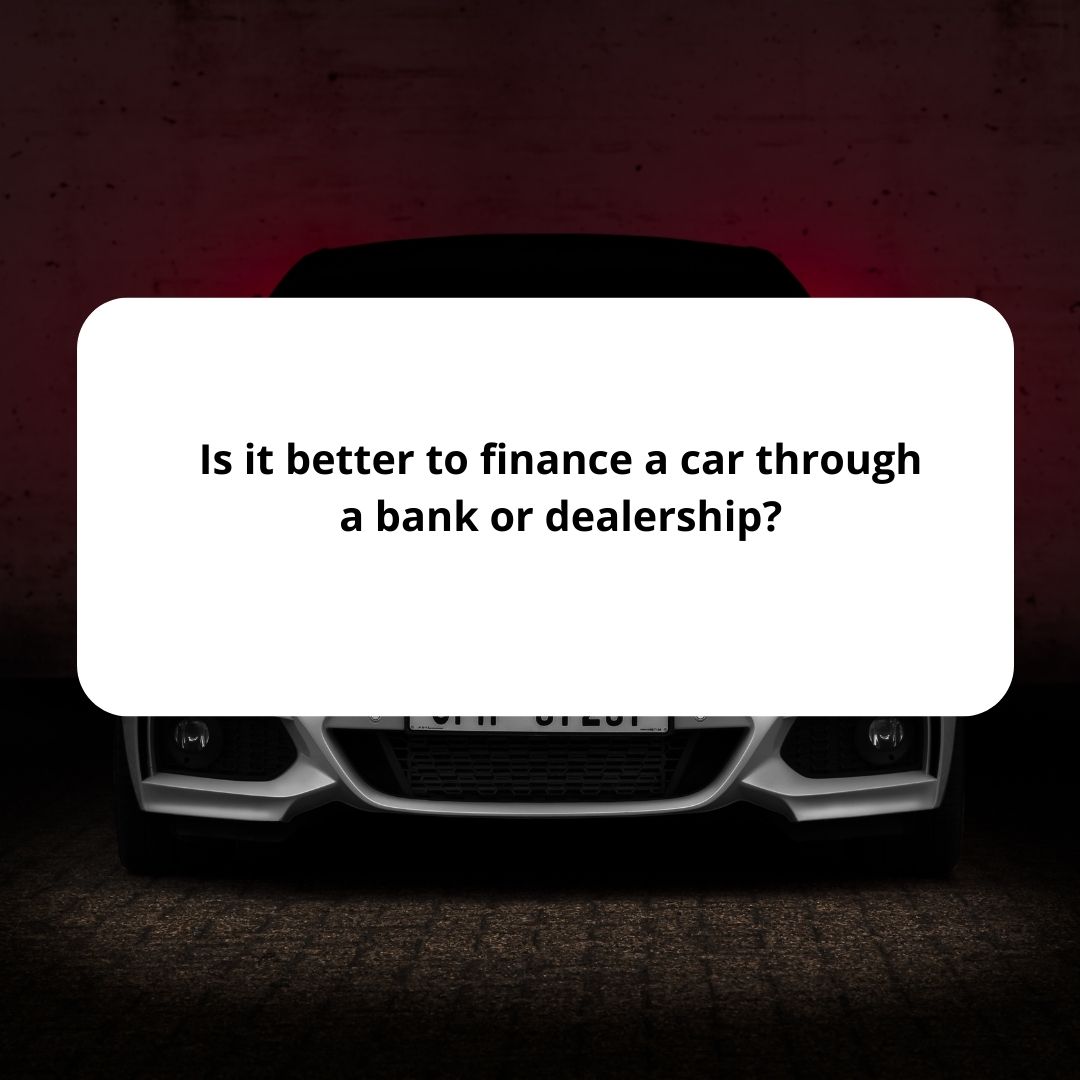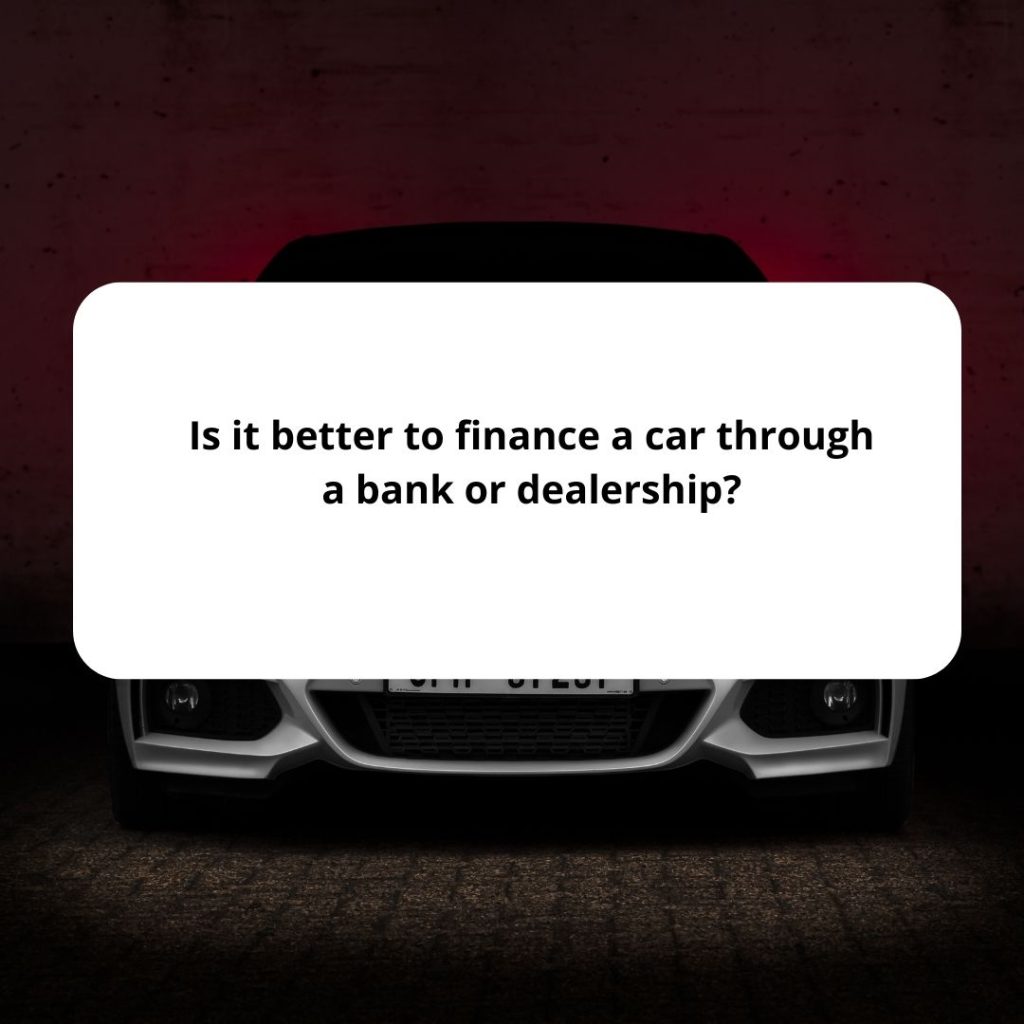> Blog > Is it better to finance a car through a bank or dealership?
Is it better to finance a car through a bank or dealership?

Buying a car can be a big decision, and many people are still undecided about which route to go. On one hand, you could go with a bank and finance your car through them. This means that you’ll have to pay interest rates and other fees, but it also means that you’re guaranteed a good deal on your car. On the other hand, you could go with a dealership and buy your car straight from them. This option may be more expensive up front, but you could potentially get a better deal on your car – especially if it’s in high demand. Which route is best for you? Let’s take a look!
Table of Contents
Pros and Cons of Financing a Car Through a Bank or Dealership
When it comes to financing a car, there are a few things to consider. One factor to consider is whether you should finance a car through a bank or dealership. Here are the pros and cons of each option.
Pros of Financing a Car Through a Bank:
– Generally speaking, banks are more reliable than dealerships when it comes to lending money. This is because banks are regulated by the government, which gives them a greater incentive to be careful with their money.
– Banks typically offer lower interest rates on car loans than dealerships do. This means that you will pay less in interest over the life of the loan.
– Banks are also more likely to give you loan modifications if you need them. Dealerships, on the other hand, may not have the same ability to help you out with loan modifications.
– If something goes wrong with your car, you can usually get help from a bank more easily than you can from a dealership.
Cons of Financing a Car Through a Bank:
– If you don’t have good credit, banks may not be willing to give you a car loan. This is because banks look at your credit score when
Which Type of Loan Is Best for Me?
When it comes to financing a car, there are a few different options available. Some people prefer to finance their purchase through a bank, while others (particularly those who have good credit) may choose to go through a dealership. Here’s a look at each option and what advantages and disadvantages they have.
Bank Loans:
The main advantage of bank loans is that they are usually cheaper than financing through a dealership. This is because banks will offer lower interest rates (which is why they’re often called “low-interest loans“). Another advantage of bank loans is that you can usually get them in amounts that are convenient for you. For example, most banks offer loans in the range of $10,000-$100,000.
One downside of bank loans is that you may not be able to get the loan amount you want. This is because banks typically limit the amount they’ll loan to a certain percentage of your car’s value. For example, if your car’s value is $20,000 and you want a loan in the range of $14,000-$24,000, your bank may only offer you a loan in the range of $16,000-$20
Car Loans: What You Need to Know?
There are many pros and cons to each option when it comes to financing a car. However, the best way to find out what works best for you is to speak with a loan officer at your bank or dealership. They can help you compare the rates, terms, and benefits of both options.

When choosing a bank car loan, be sure to consider your credit score. A good score could get you a lower interest rate on a car loan, while a low score could result in an increased interest rate and longer repayment period. Bank loans typically have shorter repayment terms than dealership car loans, which can make them more affordable if you plan to keep the car for less than five years.
Dealership car loans are often more expensive than bank loans, but they offer a range of benefits that can be important to you. These include the ability to negotiate lower interest rates, extended payment terms and the assurance of having a car ready when you need it. If you plan to keep the car for longer than five years, dealership loans may be the best option for you.
Both options have their own advantages and disadvantages, so it’s important to weigh all of them before making a decision. A loan officer at your bank or dealership can help
Buying a Used Car: The Process
There are pros and cons to both ways of buying a car, and the best way for you to decide depends on your specific needs and budget. Here’s a look at each approach:
Bank-financed cars typically have lower interest rates and may come with perks like roadside assistance and warranty coverage. However, banks may require a higher down payment than you might be able to afford, and the terms of the loan can be more restrictive than those offered by dealerships. Dealerships, on the other hand, offer competitive financing rates and may be more willing to work with you if you have less money down. Both approaches have their own benefits and drawbacks – it really comes down to what’s important to you.
If you’re looking for something reliable but don’t want to spend a lot of money, go with a bank-financed car. If you’re willing to put some extra money down, go with a dealership. It all depends on what’s best for you in the long run.
The Pros and Cons of Financing a Car Through a Bank
The pros and cons of financing a car through a bank or dealership have been debated for years. Some people feel that banks are less likely to offer good deals on car loans, while others feel that dealerships work harder to get you the best possible deal. The truth is that both banks and dealerships offer good deals on car loans, it just depends on your individual situation. Here are the key factors to consider when deciding which option is best for you:
-interest rates: When you borrow money from a bank, your interest rate will be lower than if you borrow money from a dealership. This is because banks are typically better at lending money than dealerships. However, no matter which option you choose, interest rates will still be high compared to rates available on personal loans.
-time frame: If you want to buy a car quickly, a bank loan may be the best option for you. Dealerships may require more time to get you a loan, which could impact the price of the car.
-vehicle availability: Dealerships are more likely to have vehicles available when you want one. This means that they can usually get you into a car much faster than a bank would be
The Pros and Cons of Financing a Car Through a Dealer
If you’re looking to buy a car, there are a few things you need to consider. One of the most important factors is whether you should finance the purchase through a bank or dealership.
There are pros and cons to each option. Here are the key points:
Pros of financing through a bank:
1) You can get a good rate on a car loan.
2) You have more control over your finances and can avoid high interest rates.
3) You can get financing for a longer period of time than you would with a dealership.
4) You can get help from a car loan advisor if you have any questions.
5) It’s more difficult to get rejected for a car loan from a bank than it is from a dealership.
6) You don’t have to worry about being taken advantage of by the dealer when you’re buying your car.
7) It’s easier to get your money back if something goes wrong with your car.
8) There is less paperwork involved when financing through a bank.
9) Bank loans tend to be easier to get approved for than dealership loans.
Cons of financing through
Which is Better for You?
When it comes to financing a car, many people choose one option over the other. However, which is actually the better option for you?
The answer to this question depends on your specific needs and preferences. If you want a short-term loan that you can pay off quickly, a bank might be the better choice for you. This type of loan usually has lower interest rates than loans from car dealerships, and you can usually get a loan in just a few hours.
On the other hand, if you want a long-term loan that will allow you to pay off the car over time, a dealership might be a better option. This type of loan has higher interest rates than loans from banks, but they also offer more generous terms. You can usually get a long-term loan in just a few days, and the terms usually allow you to pay off the car over several years.
So which is the best option for you? It depends on your specific needs and preferences.
The Pros and Cons of Financing a Car through a Bank
There are pros and cons to financing a car through a bank or dealership. The biggest pro of financing through a bank is that you can get a lower interest rate than you would at a dealership. The con of financing through a bank is that you may have to pay more in interest over the life of the loan.
Dealerships will also often offer incentives, such as lower rates on interest and fees, to encourage you to finance your car through them. However, there are also disadvantages to financing through a dealership. Dealerships can be more expensive than banks, and they may not offer the same range of options for down payment and loan terms.
The Pros and Cons of Financing a Car through a dealership
There are pros and cons to financing a car through a dealership. The biggest pro is that you’ll likely get a better interest rate than you would at a bank. The downside is that you may have to wait longer to get your car, and you may have to deal with pushy salespeople. Dealers also charge extra for things like warranties and insurance.
What factors should you consider when choosing which option is better for you?
When it comes to financing your car, there are a few things you should consider. First, what kind of interest rate can you get? Car dealerships typically offer better rates than banks, but banks can sometimes offer better rates if you have good credit. You also need to think about the terms of the loan. Many bank loans have longer terms than car dealership loans, so it might be worth considering a car dealership loan if you plan to keep the car for a long time. Finally, it’s important to compare the costs associated with each option. Car dealership loans often have higher fees than bank loans, so it’s important to weigh those costs against the benefits of each option.
What is the difference between financing a car through a bank and dealership?
There are a few key differences between financing a car through a bank and dealership. When you finance a car through a bank, you generally have to pay back the loan with interest over time. This means that you could end up paying more in interest than the original cost of the car. The advantage to financing through a bank is that you may be able to get a lower interest rate than you would from a dealer.
Dealership financing is often more expensive than financing through a bank. This is because dealerships can offer better rates on loans because they have more access to capital. Dealers also typically have higher overhead costs, which means that they charge higher rates for things like processing fees and advertising expenses.
There are pros and cons to both financing a car through a bank or dealership. Here’s a look at the key factors to consider when deciding which route is best for you.
Pros of financing your car through a bank:
-You can get a lower interest rate than you would with a dealership. The average interest rate on car loans from banks is around 3%. Car dealerships typically charge around 4%.
-You can get your car loan in just a few short hours. With a bank, you can often have your loan approved and ready to go within 24 hours. This is much faster than it usually takes to go through the dealership process, where you might have to wait up to two weeks for an approval.
-If something goes wrong with your car, you’re not likely to be stuck with the bill if you finance it through a bank. If you finance your car through a dealership, they may be entitled to repossess your car if you don’t make payments.
-Banks are considered reliable institutions, so you can trust them to keep your money safe. This isn’t always the case with some of the smaller, less reputable dealers
When should you finance your car through a dealership?
There are pros and cons to financing a car through a dealership. The biggest pro is that the dealership will usually offer better rates than banks. The downside is that you may have to deal with pushy salespeople. If you’re able to get a good rate through a bank, it’s worth considering.
The Pros and Cons of Financing a Car through a Bank
There are pros and cons to financing a car through a bank or dealership. Let’s take a look at the benefits of each option.
Benefits of Financing a Car Through a Bank:
-You can get a good rate on loans from banks.
-If you have excellent credit, you may be able to get an interest rate that is lower than what you would receive through a dealership.
-You have more control over your loan terms.
-You can save money by getting your car loan in advance.
-It’s easy to get approved for a car loan through a bank.
-Bank loans typically have shorter repayment periods than loans from dealerships.
Benefits of Financing a Car Through a Dealership:
-Dealerships may offer better customer service.
-They may be able to provide you with more options when it comes to financing your car, such as leasing or purchasing.
-Dealerships often provide extra warranty coverage, which can be valuable if you plan on keeping your vehicle for a long period of time.
-Dealerships are familiar with the vehicles that they sell, making
The Pros and Cons of Financing a Car through a Dealership
There are pros and cons to financing a car through a dealership. The pro side is that you can get a better interest rate and terms than you would at a bank. The con side is that you may have to pay more in fees and taxes. It’s important to weigh the pros and cons of each option before making a decision.
How to Compare C
When you’re shopping for a car loan, it’s important to compare loans from different sources. Here’s how to do it:
1. Compare interest rates. Car lenders typically offer different interest rates based on your credit score and the amount of money you’re borrowing. It’s important to compare these rates to see which one is the best deal for you.
2. Compare terms. Car loans come in different terms, such as fixed or variable. You should decide which term is best for you based on
There are several advantages to financing a car through a bank. First, banks are typically more forgiving of bad credit than dealerships. This means that you may be able to get a lower interest rate and terms on a car loan through a bank than you would through a dealership. Additionally, banks may be willing to give you longer terms on your loan, allowing you to pay off the car more quickly.
Another advantage of financing a car through a bank is that they may be more willing to share their lending resources with you. This means that you may be able to get an auto loan from a bank that is larger than what you would be able to get from a dealership. Finally, banks typically have better collections capabilities than dealerships, which can help ensure that you receive the full value of your car loan.
The Advantages of Financing a Car Through a Dealership
There are a few advantages to financing a car through a dealership. The biggest advantage is the convenience and speed of the process. When you finance a car through a dealership, they will take care of all the paperwork for you and usually have better rates than banks. Additionally, most dealerships have extensive networks of lending institutions that they can tap into to get you the best rate possible. Finally, when it comes to buying a car, dealing with a dealership is often considered more prestigious and therefore more likely to result in a sale.
Which is Better for You?
When it comes to car financing, most people think of two main options: buying a car from a dealership, or financing through a bank. But which is actually better for you? The answer to this question depends on your specific situation. Here are four factors to consider when choosing between buying and financing a car:
1. Cost: Dealing with a dealership can be more expensive than borrowing money through a bank. This is because dealerships charge higher interest rates on car loans, and often require you to pay cash or use your own credit score as part of the approval process. On the other hand, banks tend to offer lower interest rates on car loans, which means that you could end up paying less in total over the life of the loan.
2. Terms: Dealerships usually require you to buy the car outright, whereas banks often offer more flexible terms such as month-to-month or lease/purchase agreements. This means that you can potentially save money by choosing to finance a car through a bank.
3. Reputation: Dealerships have a reputation for being difficult to deal with, and many customers have reported difficulty getting their money back from dealerships after purchase. Banks
Conclusion
Buying a car can be a big investment, and it’s important to choose the right financing option for you. In this article, we will compare the two most common types of car financing: bank loans and dealership loans. We’ll also discuss the pros and cons of each type of loan, so that you can make an informed decision about which one is best for you. Finally, we will provide some tips on how to get approved for a car loan through a bank or dealership. Thanks for reading!
your budget and needs.
3. Compare fees and penalties. Some car loans have fees and penalties that can add up over time. Be sure to compare these costs before making a decision.
4. Consider your repayment schedule. Some car loans require you to make monthly payments while others allow you to make lump-sum payments at the end of the loan term. Decide which option is best for you and your financial situation.

Hello Friends! This is Firan Mondal, a Mechanical Engineering having more than 14 years of experience in various industries. I love Automotive Engineering and it’s my pleasure to associate with this subject. Currently, I am associated with an MNC company, exploring my knowledge domain in the Automotive sector and helping people to select relevant dealers in their footsteps without any hindrance.
Recent Posts
-
Best In House Financing Car Dealers Near Me in 2024
June 4, 2024
-
Buy Here Pay Here Corbin KY-Best used Car Dealerships In Corbin KY
June 4, 2024
-
Buy Here Pay Here Car Dealership Fredericksburg VA – Best BHPH Car lots of 2024
June 4, 2024
-
Buy Here Pay Here Car Lots Texarkana : Your Trusted Used car lots in Texarkana in 2024
May 22, 2024
-
Buy Here Pay Here Car Lots Springfield mo : Best Used Car lots in Springfield mo
May 12, 2024
-
How to Find Best Buy Here Pay Here Campers Near Me
May 7, 2024


Leave a Reply